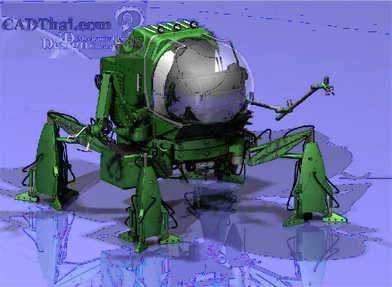สาขาวิจัย:
เมคคาทรอนิกส์และหุ่นยนต์Thermo-Fluids
The Thermo-Fluids area is one of the foundational activities that define mechanical engineering. Computational and experimental facilities are used in fundamental studies and applications of thermodynamics, fluid mechanics and heat transfer. Our work on these subjects involves both creative synthesis and engineering design that cover the following technical areas:
- Combustion and engine research
- Computational fluid dynamics
- Energy efficient buildings
- Fire protection engineering
- Refrigeration and air-conditioning systems
- Renewable energy
- Thermal management of industries
- Two-phase flows

In this picture: A computational mesh for a 4-valve diesel engine cylinder with a swirl port
This was part of Eakkawut Pattarajare’s research work under supervision of Dr.Tanet Aroonsrisopon.
This activity was performed using AVL-FIRE, a CFD software tool for advanced engine simulation, licensing under the University Partnership Program agreement between Kasetsart University and AVL GmbH.
The System Dynamics and Controls
The System Dynamics and Controls area seeks to promote research and education into identifying fundamental principles and methodologies that enable systems to exhibit intelligent, goal-oriented behavior, and developing innovative instruments to monitor, manipulate, and control systems. Our focus is on a system-level behavior emerging primarily from interactions – unexplainable from individual component behavior alone.
Fundamental and applied research activities are conducted by using analytical, numerical and experimental activities. These activities intimately support product development, safety, weight minimization and component optimization for mechanical components and general manufacturing. Current areas of emphasis include
- Methodologies for understanding system behavior through physical modeling, identification, and estimation
- Technologies for sensors and sensor networks; actuators and energy transducers; and systems for monitoring, processing, and communications information
- Fundamental theories and methodologies for analyzing, synthesizing, and controlling systems; learning and adapting to unknown environments; and achieving task goals

In this picture: New Dimension Two-wheeled Vehicle
Winning an honorable mention in the 2009 KU Innovation awards, this invention was created by Kittipong Yaovaja and Kittinun Prasertsom under supervision of Dr.Withit Chatlatanagulchai.
The Applied Mechanics
The Applied Mechanics area is applied to the characterization of mechanical components, structures, systems and materials linear and nonlinear vibrations, dynamics, and acoustics, with applications in advanced materials, biomechanics and biological materials, mechanics of manufacturing processes, noise and vibration control in suspensions, brakes, and other automotive/aerospace systems, experimental model identification for multi-body systems, and structural health monitoring for prognosis of stationary devices, ground vehicles, and other mechanical components.
Faculty and students in the Applied Mechanics area conduct both basic and applied research. Basic research advances our fundamental understanding of both experimental and theoretical mechanics. Applied research involves the development of mechanical components that are more compact and lighter, as well as more efficient and longer lasting. Applied research could also involve the development of measurement and prediction methodologies for assessing the destructive effects of operating loads and the environment in mechanical materials and systems, for example, in automotive suspensions and body armor.

Design and Manufacturing
Design and Manufacturing activities include the design and manufacturing of machines, systems, products, mechanisms and processes. This research area seeks to educate a new generation of versatile innovators by integrating entrepreneurship, creativity, design, prototyping, manufacturing, and systems with new, leading-edge techniques and processes for design, manufacturing, and product development. A wide range of research activities are conducted at Research and Development institute of Production Technology (RDiPT).

